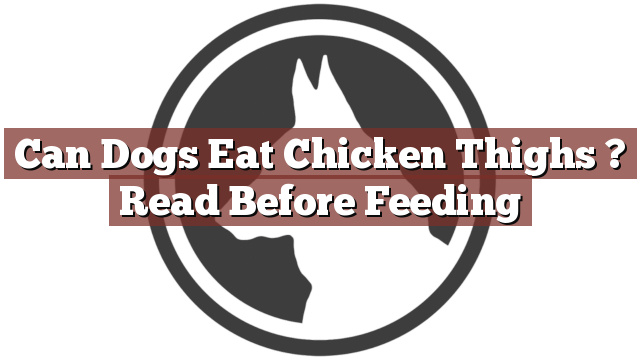Understanding Your Dog’s Dietary Needs
As a responsible dog owner, it is crucial to understand your furry friend’s dietary needs. Providing a balanced and nutritious diet is essential for their overall health and well-being. While dogs are primarily carnivorous, their nutritional requirements may vary depending on their breed, age, size, and overall health condition.
Can Dogs Eat Chicken Thighs? Read Before Feeding
Can dogs eat chicken thighs? This is a common question among dog owners who are looking to add variety to their pet’s diet. The answer is yes, dogs can eat chicken thighs, but there are some important considerations to keep in mind before feeding them to your furry companion.
Chicken thighs are a good source of protein for dogs, which is necessary for building and repairing tissues, as well as promoting a healthy coat and strong muscles. They also contain essential amino acids that contribute to your dog’s overall well-being. However, it is important to note that chicken thighs should be cooked thoroughly to eliminate any harmful bacteria, such as salmonella, that can cause food poisoning in dogs.
Pros and Cons of Feeding Chicken Thighs to Your Dog
Feeding chicken thighs to your dog comes with both pros and cons. The main advantage is that they are a rich source of protein, which is essential for your dog’s growth and development. Additionally, chicken thighs are highly palatable, making them an enticing option for dogs with picky appetites.
However, it is crucial to be aware of the potential drawbacks as well. Chicken thighs are high in fat, which can lead to weight gain and obesity if fed excessively. This is especially important to consider for dogs that have a tendency to gain weight easily. Additionally, the bones in chicken thighs pose a choking hazard and can splinter, causing harm to your dog’s digestive tract. Therefore, it is important to remove all bones before feeding chicken thighs to your furry friend.
In Conclusion: Considerations for Feeding Chicken Thighs to Your Dog
While dogs can eat chicken thighs, it is important to do so in moderation and with caution. Cook the chicken thoroughly to eliminate any harmful bacteria, and ensure that all bones are removed to prevent choking and digestive issues. It is always best to consult with your veterinarian before making any changes to your dog’s diet, especially if they have any underlying health conditions or dietary restrictions. By understanding your dog’s specific nutritional needs and making informed decisions, you can ensure that they live a happy and healthy life.
Thank you for taking the time to read through our exploration of [page_title]. As every dog lover knows, our furry friends have unique dietary needs and responses, often varying from one canine to another. This is why it's paramount to approach any changes in their diet with caution and knowledge.
Before introducing any new treats or making alterations to your dog's diet based on our insights, it's crucial to consult with a veterinarian about [page_title]. Their expertise ensures that the choices you make are well-suited to your particular pet's health and well-being.
Even seemingly harmless foods can sometimes lead to allergic reactions or digestive issues, which is why monitoring your dog after introducing any new food item is essential.
The content provided here on [page_title] is crafted with care, thorough research, and a genuine love for dogs. Nevertheless, it serves as a general guideline and should not be considered a substitute for professional veterinary advice.
Always prioritize the expert insights of your veterinarian, and remember that the health and happiness of your furry companion come first.
May your journey with your pet continue to be filled with joy, love, and safe culinary adventures. Happy reading, and even happier snacking for your canine friend!

